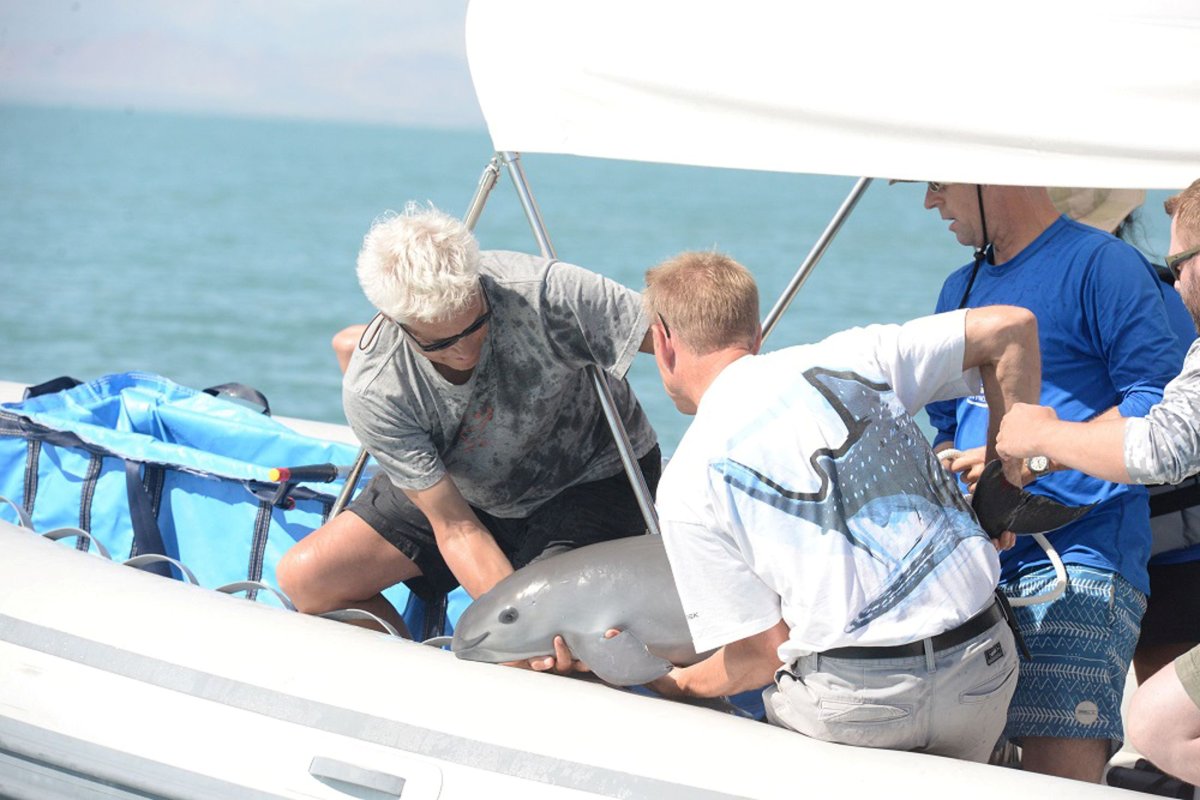One of the world's most endangered marine mammals could face extinction as soon as this year if an illegal fishing operation continues to tangle and kill the porpoises as bycatch.
The vaquita, a petite porpoise native only to Mexico's northern Gulf of California, is a casualty of the black market for totoaba, another endangered and protected fish killed and sold for its prized bladder. As conservation initiatives founder and local fishermen continue to profit off the illegal trade, the vaquita's population has dwindled from 600 to fewer than 30 in the past 20 years.
In 2015, Mexican President Enrique Peña Nieto banned gill nets, the massive webs of mesh used to capture masses of totoaba that also entangle vaquitas. But the ban hasn't dissuaded "fishing cartels" from leading poaching operations that face little to no resistance from state officials, said Lorenzo Rojas Bracho, head of marine mammal conservation and research for Mexico's National Institute of Ecology and Climate Change.
"You have mafias or organized crime moving this product from Mexico to China entering the black market," Rojas Bracho told CBS station KPIX in San Francisco. "You have authorities, bribes and all the ingredients of this kind of mass disease."
The totoaba's large bladders, which fill with air to control how it floats, are a medicinal delicacy in China and used in soups nicknamed "aquatic cocaine" for their value, CNN reported. The fish is similar in size to the vaquita, which usually grows only to 4 to 5 feet in length and weighs around 100 pounds, and both inhabit only the northern waters of the Gulf of California, where nearby communities rely on fishing.

But the trade is so profitable officials fear it will continue even after it wipes out the remaining vaquitas. A 2013 U.S. Fish and Wildlife Service seizure of illegal bladders was valued at more than $3.6 million, NPR reported in 2016, and individual bladders are worth as much as $250,000 on the black market.
Past efforts to save vaquitas and end illegal totoaba fishing have ended in failure. UNESCO declared the Gulf of California a World Heritage Site in 2005 to protect the area's vaquitas, already protected under the Endangered Species Act, but fishing resumed. In 2017, marine researchers ended an initiative called Vaquita CPR, in which scientists caught and sequestered vaquitas in pens in attempts to breed them in captivity, after a female of breeding age died within hours of her capture, The Washington Post reported.
The latest conservation push came Thursday, when an international trade court judge ordered the Trump administration to ban all seafood caught in the northern Gulf of California using gill nets. The ban, reported to affect more than $16 million worth of fish and shrimp caught in the gulf, could potentially regrow vaquita and totoaba populations but spell disaster for towns that depend on the industry. San Felipe, Mexico, fisherman Sunshine Rodriguez told the Los Angeles Times that they'll sell instead to China, where the demand for seafood remains high.
"It's a global market, and we're going to have to find alternative buyers," he said.
Still others believe new policies to protect the few vaquitas left in the wild have come too late.
"I really fear the vaquita will be a sad footnote on history of our failure to act and collaborate and cooperate soon enough to save the species," Peter Knights, CEO of environmental nonprofit WildAid, told KPIX.
Uncommon Knowledge
Newsweek is committed to challenging conventional wisdom and finding connections in the search for common ground.
Newsweek is committed to challenging conventional wisdom and finding connections in the search for common ground.
About the writer
Scottie is a Newsweek science fellow and student at the University of Florida. Her work has appeared in Women's Health, the Gainesville ... Read more
To read how Newsweek uses AI as a newsroom tool, Click here.








